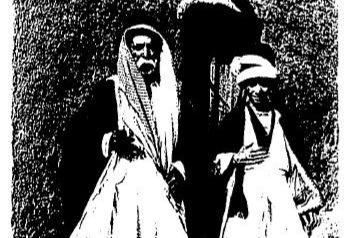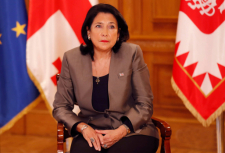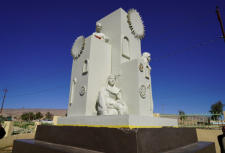Daoud: A symbol of the struggle against tyranny

Daoud was the head of the Yezidi tribe of Mehrkan in Shangal. The exact date of his birth is not known. From 1935 to 1941, he raised a series of Yezidi uprisings in the former mandated Mesopotamia, which became the sovereign state of Iraq.
In September 1929, Great Britain declared its readiness to recommend the Kingdom of Iraq for membership in the League of Nations. To consolidate the political and military-strategic interests of Great Britain in Iraq, the Anglo-Iraqi alliance treaty was signed on June 30, 1930, for a period of 25 years. It provided for the automatic termination of the mandate from the moment of Iraq's admission to the League of Nations and the proclamation of the country as a sovereign independent State.
On October 3, 1932, Iraq became a member of the League of Nations, which terminated the British mandate in Mesopotamia. King Faisal stood at the head of the country. The promises made by the Iraqi Government to the Yezidis towards the end of the British colonial period were not kept, which worsened their situation.
When the leader of the Yezidis, Shangal Hamoe Sharo, died in 1933, the Yezidis' fear of uncertainty began to increase, because Sharo had close contacts with the British, who took the Yezidis under their protection. In the same year, the Arabs and Kurds brutally suppressed the Assyrian uprising. The Yezidis were also required to take part in the suppression of the Assyrian uprising, but the Yezidi leaders categorically refused to participate in this. Thus, revenge from the Arabs and Kurds was to be expected. These events forced Daoud to return to Shangal in 1933. On October 20, he led his tribe and took the initiative into his own hands.
In 1934, the Government of Iraq adopted the law "On National Defense", which turned voluntary military service into general conscription. The law was ratified in 1935. The Yazidis faced the question: to serve in the Iraqi army or not. As in the Ottoman Empire, the Yezidis rejected this law for religious reasons. They also considered it unwise to serve in the Muslim army. For this reason, the Yazidi leaders began to negotiate with the Iraqi government, offering a compromise that was rejected by Baghdad.
Daoud did not participate in the negotiations. Initially, he considered the Iraqi government illegitimate. Thus, he began to prepare the Yezidis of his tribe to fight the Iraqi army in the villages of Zervan, Aldina and Mehrkan.
As Baghdad stood firm in its position and refused to make concessions, the supporters of Daoud began to prepare for the worst. They sent a delegation to Syria to enlist the support of the French in Hasakah. To defuse the situation, the Iraqi Government sent its representatives to the Yezidi villages. They held talks with Khudeda, the son of Hamoe Sharo, and with the leader of the Yezidis, Mir Said Beg. The latter tried to dissuade Daoud from speaking out against the Iraqi army, but all efforts were in vain.
Padje Kolo joined Dauda together with his supporters. In 1935, fighting began between the Yezidis and the Iraqi army. The operation against the Yezidis was led by Brigadier General Hussein Fawzi. Daoud and Padjoe Kolo put up fierce resistance. The clashes lasted from November 1 to November 17, 1935. The Yezidis, with 700 fighters, courageously fought against the Iraqi army, police and air force of the country. On November 7, in one day, the Iraqi army lost 40 of its soldiers. The battles took place in the eastern part of the Shangal Mountains. Eleven Yezidi villages were destroyed by the Iraqi army. It is noteworthy that these settlements were not included in the combat zone, which can be regarded as a war crime and an act of aggression against the Yezidis.
200 Yazidis were killed and 120 people were injured. On November 14, the Iraqi Government imposed martial law in the Shangal region. This allowed the military and police to pursue the Yezidis and subject them to arrest. In one month, 364 Yezidis were arrested, 9 of them were sentenced to death, 69 people – to imprisonment from 20 to 70 years, 162 people – to imprisonment up to 15 years, 54 Yezidis were forcibly relocated. Daoud fled with his family to Syria, to Qamishlo, where he received asylum.
The Iraqi government demanded that the French hand over the leader of the Yezidi tribe Mehrkan, but they rejected their demand. Some British politicians have condemned the actions of the Iraqi government, especially the death sentences. Former British Ambassador Archibald Clark Keir saw religious motives in this and sharply condemned it. He demanded a general amnesty for the Yezidis, which was rejected by Baghdad.
After the suppression of the Yezidi uprising and further punitive operation against them, they tried to flee to Syria. This prompted the British Embassy to put pressure on the Iraqi authorities to change their policy towards the Yezidis. As a result of the intervention of the British, the captured Yezidis were released, 25 of the 54 forcibly displaced persons returned to their homes. In 1936, Hikmet Suleiman, the Prime Minister of Iraq, granted amnesty to the Yezidis. More than 200 of them were pardoned.
In 1938, clashes broke out again between the Yezidis and the Iraqi army. The British took this news with concern. They were concerned about the rights of minorities in Iraq and again intervened in the situation and put pressure on the Iraqi Government. In the 1940s, the British managed to resolve the situation. And Daoud has become a symbol of resistance against tyranny not only among the Yezidis, but also among all minorities who have been discriminated against.
Source-Ezidipress
Tags: #yazidis #yezids #ezidi #sindjar #shangal #ezidxan
Daoud: A symbol of the struggle against tyranny

Daoud was the head of the Yezidi tribe of Mehrkan in Shangal. The exact date of his birth is not known. From 1935 to 1941, he raised a series of Yezidi uprisings in the former mandated Mesopotamia, which became the sovereign state of Iraq.
In September 1929, Great Britain declared its readiness to recommend the Kingdom of Iraq for membership in the League of Nations. To consolidate the political and military-strategic interests of Great Britain in Iraq, the Anglo-Iraqi alliance treaty was signed on June 30, 1930, for a period of 25 years. It provided for the automatic termination of the mandate from the moment of Iraq's admission to the League of Nations and the proclamation of the country as a sovereign independent State.
On October 3, 1932, Iraq became a member of the League of Nations, which terminated the British mandate in Mesopotamia. King Faisal stood at the head of the country. The promises made by the Iraqi Government to the Yezidis towards the end of the British colonial period were not kept, which worsened their situation.
When the leader of the Yezidis, Shangal Hamoe Sharo, died in 1933, the Yezidis' fear of uncertainty began to increase, because Sharo had close contacts with the British, who took the Yezidis under their protection. In the same year, the Arabs and Kurds brutally suppressed the Assyrian uprising. The Yezidis were also required to take part in the suppression of the Assyrian uprising, but the Yezidi leaders categorically refused to participate in this. Thus, revenge from the Arabs and Kurds was to be expected. These events forced Daoud to return to Shangal in 1933. On October 20, he led his tribe and took the initiative into his own hands.
In 1934, the Government of Iraq adopted the law "On National Defense", which turned voluntary military service into general conscription. The law was ratified in 1935. The Yazidis faced the question: to serve in the Iraqi army or not. As in the Ottoman Empire, the Yezidis rejected this law for religious reasons. They also considered it unwise to serve in the Muslim army. For this reason, the Yazidi leaders began to negotiate with the Iraqi government, offering a compromise that was rejected by Baghdad.
Daoud did not participate in the negotiations. Initially, he considered the Iraqi government illegitimate. Thus, he began to prepare the Yezidis of his tribe to fight the Iraqi army in the villages of Zervan, Aldina and Mehrkan.
As Baghdad stood firm in its position and refused to make concessions, the supporters of Daoud began to prepare for the worst. They sent a delegation to Syria to enlist the support of the French in Hasakah. To defuse the situation, the Iraqi Government sent its representatives to the Yezidi villages. They held talks with Khudeda, the son of Hamoe Sharo, and with the leader of the Yezidis, Mir Said Beg. The latter tried to dissuade Daoud from speaking out against the Iraqi army, but all efforts were in vain.
Padje Kolo joined Dauda together with his supporters. In 1935, fighting began between the Yezidis and the Iraqi army. The operation against the Yezidis was led by Brigadier General Hussein Fawzi. Daoud and Padjoe Kolo put up fierce resistance. The clashes lasted from November 1 to November 17, 1935. The Yezidis, with 700 fighters, courageously fought against the Iraqi army, police and air force of the country. On November 7, in one day, the Iraqi army lost 40 of its soldiers. The battles took place in the eastern part of the Shangal Mountains. Eleven Yezidi villages were destroyed by the Iraqi army. It is noteworthy that these settlements were not included in the combat zone, which can be regarded as a war crime and an act of aggression against the Yezidis.
200 Yazidis were killed and 120 people were injured. On November 14, the Iraqi Government imposed martial law in the Shangal region. This allowed the military and police to pursue the Yezidis and subject them to arrest. In one month, 364 Yezidis were arrested, 9 of them were sentenced to death, 69 people – to imprisonment from 20 to 70 years, 162 people – to imprisonment up to 15 years, 54 Yezidis were forcibly relocated. Daoud fled with his family to Syria, to Qamishlo, where he received asylum.
The Iraqi government demanded that the French hand over the leader of the Yezidi tribe Mehrkan, but they rejected their demand. Some British politicians have condemned the actions of the Iraqi government, especially the death sentences. Former British Ambassador Archibald Clark Keir saw religious motives in this and sharply condemned it. He demanded a general amnesty for the Yezidis, which was rejected by Baghdad.
After the suppression of the Yezidi uprising and further punitive operation against them, they tried to flee to Syria. This prompted the British Embassy to put pressure on the Iraqi authorities to change their policy towards the Yezidis. As a result of the intervention of the British, the captured Yezidis were released, 25 of the 54 forcibly displaced persons returned to their homes. In 1936, Hikmet Suleiman, the Prime Minister of Iraq, granted amnesty to the Yezidis. More than 200 of them were pardoned.
In 1938, clashes broke out again between the Yezidis and the Iraqi army. The British took this news with concern. They were concerned about the rights of minorities in Iraq and again intervened in the situation and put pressure on the Iraqi Government. In the 1940s, the British managed to resolve the situation. And Daoud has become a symbol of resistance against tyranny not only among the Yezidis, but also among all minorities who have been discriminated against.
Source-Ezidipress
Tags: #yazidis #yezids #ezidi #sindjar #shangal #ezidxan

























